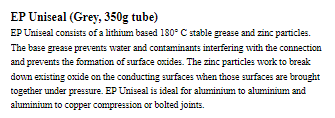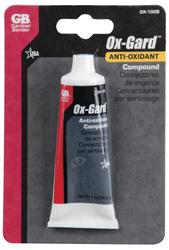Minimoose
New Member
I hear you there!?If I tell my wife I think it's OK I'm pretty sure she'll disagree
I hear you there!?If I tell my wife I think it's OK I'm pretty sure she'll disagree
I wouldn’t want a conductive path in places where it was not wanted. Grease is messy stuff. E.g.: smeared on insulation.
From reading just the thread headline I thought it was Hot Sauce.I’ve been putting dielectric grease on every connection I make.
I put in wire before crimping on lugs, I put it on busbars before landing the lugs, I put it inside my solar panel connectors, no put it on my battery terminal, I put it on the electrical plugs on my jeep when I’m replacing a light, etc.
As far as I can tell from looking around on the googles, this is never a mistake. Does anybody disagree?
From reading just the thread headline I thought it was Hot Sauce.
Oh well . ?

I’ve been putting dielectric grease on every connection I make.
I put in wire before crimping on lugs, I put it on busbars before landing the lugs, I put it inside my solar panel connectors, no put it on my battery terminal, I put it on the electrical plugs on my jeep when I’m replacing a light, etc.
As far as I can tell from looking around on the googles, this is never a mistake. Does anybody disagree?

Because aluminum custom busbars are so affordable and easy to obtainWhy would anyone want an insulator between two conductive surfaces? Use tin coated everything...
Ox-Gard is not Dielectric Grease. It's mostly a Zinc based substance.Dielectric grease is an insulator. Why would anyone want an insulator between two conductive surfaces? Use tin coated everything and apply the grease on the external metallic surfaces if you want the extra protection.
NoAlox is also very good product. I have not used it but I hear a lot guys praising it.I first became familiar with NoAlox 25 years ago when my electrician used it to coat the Aluminum busbar on a new main service panel. I lived near the ocean and the salt air was hard on the bus bars. Ten years later when I did an EV conversion it seemed logical to apply it to aluminum terminal tops and copper bus bars. I live fifty miles from the ocean now but I still use it for both my battery connections and breaker panel connections.
What if it doesn't move? What if it creates a pocket, and get sealed in with 1-4T of surrounding pressure? Why do compression fittings work on hydraulic lines?How?
Do you think this stuff stay in place, between lug and busbar, when you apply torque and the resulting pressure is 1-4 tons for M6-M12 screw?
I mean, of course the grease will move and the contact will be metal-metal with grease around who seal the contact.
I use Frank's on every connection I make! It makes them nice and clean!From reading just the thread headline I thought it was Hot Sauce.
Oh well . ?
I use Ox-Gard exclusively... Phhht, I needed it for something about a zillion years ago, and they only had this large tube of Ox-gard at the hardware store, I still have 1/2 a tube, I lost the cap, so it sits upright with a nail in the end. That's the problem when you are not an electrician, or a plumber, or a ... My can of pvc glue is usually hard before I need it again. I've somehow obtained two cans of bearing grease, both used at least once, ... <sigh>. I'm not sure why I have a laser level, I don't think I've ever used it.NoAlox is also very good product. I have not used it but I hear a lot guys praising it.
It seems like a shift happened many years ago and Ox-Gard became the more popular solution.
I don't scream about it but I do put NoAlox on my aluminum battery terminals and the copper bus bars that connect them.I don't hear anybody screaming about just bolting a lug to an aluminum terminal


